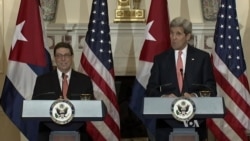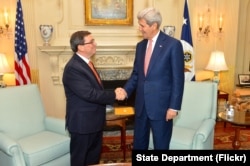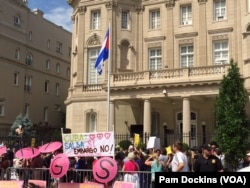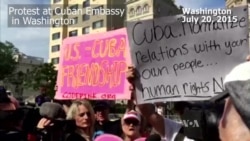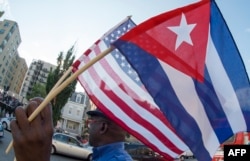As onlookers chanted “Viva Cuba, Viva Fidel,” the Cuban flag was hoisted outside of the country’s newly established embassy in Washington on Monday.
The gesture marked a symbolic end to more than five decades of hostility and mistrust between the two countries.
READ: President Obama's Statement on Cuba Policy Changes
The U.S. also opened its embassy in Cuba on Monday, but there was no ceremony. That will take place when Secretary of State John Kerry visits Havana on August 14.
Monday afternoon, Kerry and Cuban Foreign Minister Bruno Rodriguez held talks during the first visit by a Cuban foreign minister to the State Department in more than 50 years.
Kerry has called the restoration of diplomatic relations with Cuba a "new beginning," but he said many differences remain.
He said the full normalization process will be “long and complex.”
“Along the way, we are sure to encounter a bump here or there and moments even of frustration,” said Kerry. “Patience will be required,” he added.
Rodriguez spelled out some of the differences that he discussed with Kerry, including Cuba’s desire for an end to the U.S. trade embargo as well as the return of the U.S. military base at Guantanamo Bay.
Mixed crowd at flag-raising
Well-wishers and protesters were among those on hand for Monday’s flag-raising at the stately mansion that serves as the Cuban embassy in Washington.
Some demonstrators chanted and waved colorful banners calling for an end to the U.S. trade embargo.
Orlando Luis Pardo, a Cuban from Havana, was among those attending. He praised normalization efforts but criticized Cuban leader Raul Castro’s government for its restrictions.
“We deserve freedom of organization, peaceful organization. We deserve freedom of demonstrations, peaceful demonstrations,” he said.
Another spectator, Center for a Free Cuba executive director Frank Calzon, had criticism for President Barack Obama’s administration.
He said the U.S. was hasty in removing Cuba from its State Sponsors of Terrorism list and said the U.S. should have sought more concessions from Cuba on human rights issues before moving to re-establish ties.
While the U.S. did not hold a ceremony at its embassy in Havana to mark the resumption of relations, it did hoist the Cuban flag to hang alongside those from other nations at the State Department.
U.S. critics
The historic diplomatic shift comes 54 years after a diplomatic break that happened during U.S. President John Kennedy's administration.
Republican U.S. Senator Marco Rubio has said there has not been enough emphasis on Cuba's human rights record. He said earlier this year, "Their view of human rights isn't just different than ours, they are flat-out wrong and immoral in their views."
Roger Noriega, an American Enterprise Institute analyst and a former U.S. ambassador to the Organization of American States, also expressed concern about Cuba's human rights record, saying "I think we have had to lower our standards in order to raise our flag in Havana."
In a statement, White House Press Secretary Josh Earnest welcomed the historic event.
"This is yet another demonstration that we don’t have to be imprisoned by the past. We look forward to working collaboratively to normalize relations with the Cuban government and people after more than half a century of discord," the statement said.
WATCH: Protesters outside Cuban Embassy in Washington, DC
Bilateral talks continue
State Department spokesman John Kirby said the U.S. and Cuba continue to have discussions on a wide range of issues.
“We began a conversation that I suspect will continue on human rights, which we know is going to be a part of this new relationship,” said Kirby.
He also said the U.S. and Cuba had agreed to have conversations about fugitives and law enforcement.
* Check out our Storify for more reaction to the reopening of Embassies
Long, complex process
In a statement on the Cuban Foreign Ministry website, the Cuban government said the re-establishment of diplomatic ties and opening of embassies “completes the first stage of what will be a long and complex process toward the normalization of bilateral relations.”
The statement also said there could be no “normal” relations between the two countries “as long as the economic, commercial and financial blockage continues to be fully implemented, causing damage and scarcities to the Cuban people.”
However many Cubans have praised their government for enacting the changes and welcome the improved relations with the United States. Some have begun to sport clothing with the U.S. flag and other American symbols.




